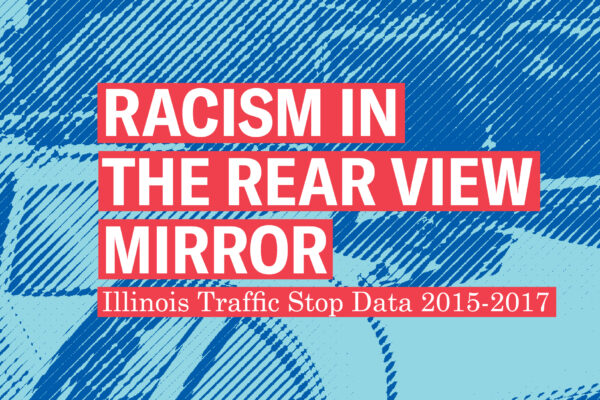New website allows public to view traffic stop & search rates for law enforcement agencies across Illinois
A new report from the ACLU of Illinois confirms that racial disparities persist in Illinois traffic stops. Black and Latinx drivers are searched at higher rates than white drivers across the state. The report examines several years of data collected by the Illinois Department of Transportation (IDOT) as part of the Illinois Traffic and Pedestrian Stop Statistical Study Act, first championed by then-State Senator Barack Obama.
The release of the ACLU report coincides with the launch of a new website: illinoistrafficstops.com. Data scientists Mollie Pettit and Chris Kucharczyk, and front-end engineer Alex Alleavitch worked with the ACLU of Illinois to evaluate all available IDOT data from 2017 and create a data visualization tool that allows people to search and view traffic stop data for each law enforcement agency in Illinois. The data scientists plan to update the website each year as new data becomes available.
The ACLU report identifies significant racial disparities in searches by law enforcement in recent years, including:
- Black and Latinx drivers were searched about 1.8 and 1.4 times more often, respectively, than white drivers.
- Black and Latinx drivers were more likely to be asked to be searched, even though they were less likely to be found with contraband during consent searches than white drivers.
“Baseless traffic stops and inconsistent search standards that disproportionately affect Black and Latinx drivers harm the public trust and damage police-community relationships. We hope that this report and website will be a tool for law enforcement agencies and the public to identify any racial disparities in their local traffic stops, and to develop solutions to correct any unjustified disparities and improve their interactions with drivers,” said Rachel Murphy, Staff Attorney, Police Practices Project, ACLU of Illinois.
Two stark trends emerge from reviewing several years of data for Illinois’s biggest city, Chicago.
First, Chicago traffic stops have more than tripled since 2015. Chicago Police officers made 85,965 traffic stops in 2015. The next year, that number jumped to 187,133, and then jumped again to 285,067 in 2017.
Second, Black drivers account for the majority of this increase in traffic stops. Though Black residents comprise approximately one-third of Chicago’s population, Black drivers accounted for nearly two-thirds of Chicago traffic stops in 2016 and 2017.
EFFECT ON BLACK AND LATINX DRIVERS IN ILLINOIS
In January 2016, Richard Jackson, a Black military veteran, was driving in the Austin neighborhood on the west side of Chicago when he noticed a car following him for several blocks. As Mr. Jackson turned into the alley leading to his driveway, the unmarked police car pulled him over and four officers got out of their vehicle, yelling at Mr. Jackson to lower all four of his car windows. Mr. Jackson’s grandparents, who live on the first floor of his home, watched from the window in fear. The officers approached Mr. Jackson, ran his license, and then told Mr. Jackson that he would be let go with a warning.
When Mr. Jackson asked an officer why he had been stopped, the police officer grew agitated and asked if Mr. Jackson wanted to “tell it to a judge.” After that, the officer lied and said that Mr. Jackson had cut their vehicle off and ran a stop sign, and he issued Mr. Jackson two citations. Mr. Jackson fought the baseless citations, and both were ultimately dismissed.
“No matter where I may be driving, I still worry I am going to get pulled over for ‘driving while black.’ While my ticket was dismissed, when I went to make a complaint about the officers, the process went nowhere and no one was held accountable. Unfortunately, this data shows that what happened to me, is happening across Illinois,” said Jackson.
RECOMMENDATIONS
As a result of this data and evidence, the ACLU of Illinois makes the following recommendations to help decrease racial disparities and bias in traffic stop enforcement:
- Make permanent the Illinois Traffic and Pedestrian Stop Statistical Study Act
- Abolish consent searches during traffic stops
- Review and report data on police dogs
- Consistent statewide use of body cameras
- Investigate and report all outcomes of complaints against officers
Documents
Stay Informed
Sign up to be the first to hear about how to take action.
By completing this form, I agree to receive occasional emails per the terms of the ACLU’s privacy statement.
By completing this form, I agree to receive occasional emails per the terms of the ACLU’s privacy statement.

